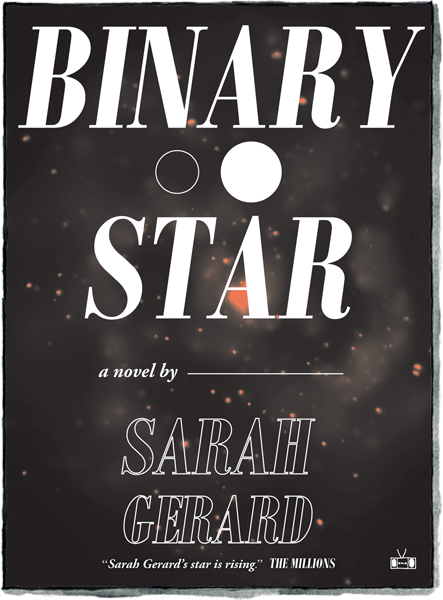“Sickness is reciprocal,” says the unnamed narrator of Binary Star, Sarah Gerard’s feverish debut novel. The narrator is anorexic and involved in a long-distance relationship with an abusive alcoholic who has latched onto a blurred vision of anarchist veganism.
“It’s a symbiotic relationship of sickness,” says Gerard. “It’s something that the narrator shares with her culture, also shares with her boyfriend. She’s battling within herself this desire to stay sick and this desire to live.”
Gerard, who has herself struggled with the disease, began writing the novel in the fall of 2012. After repeated attempts to move past the prologue, she secluded herself for a month and composed the majority of the book in blur of frenetic writing.
“I couldn’t live in a world of rationality while I writing it,” she says. “The subject matter is very irrational. Being around very rational people I felt this pressure to act very reasonable and it wasn’t working for this story. I had to go be somewhere I could be crazy.”
The result, a slim novel of 166 pages, makes for a visceral reading experience. It serves her subject and characters well. Gerard has stripped down the novel form, leaving only the barest of essentials. She foregoes dialogue tags; descriptive passages are used sparingly. The reader is entirely subsumed in the narrator’s disordered perspective. Paragraphs are often a single sentence, the sentences sometimes as short as four words:
“I throw away everything I’ve accreted.
I shed my outer layers.
I eat dark matter.”
Gerard borrows cleverly from astronomy. A binary star, as the novel describes in the opening pages, is a system of two stars that orbit a common centre of mass. They are bound together by gravity. The author, who recently left a staff position at Brooklyn’s Bomb Magazine, learned about the system while writing a review of Charles Yu‘s How to Live Safely in a Science-Fictional Universe for the publication.
“I found that language really powerful and really moving,” she says. “I was writing another novel about a pair of friends and saw really immediately how I could map that metaphor onto that relationship, but it didn’t really work because the relationship itself wasn’t compelling enough.”
The destructive relationship between the narrator and her boyfriend John is compelling, even as John himself is vile. He drinks to the point of oblivion. He talks at the narrator, rarely with. He insults her friends, gets in fist-fights with strangers. His physical desire for her is only manifest in degrading or violent ways. The novel is painful to read at points; a razor-sharp depiction of addiction and an unflinching look at our misogynist culture.
The couple take a cross-country road trip together. They are looking for adventure, but what they encounter is only the banality of the brand: Days Inn hotels, Denny’s restaurants, gas stations stocked with Coke and Red Bull.
In Portland they find a small zine distributor, sandwiched between a Chipotle and a Moe’s Southwest Grill. They talk to the owner about animal liberation and leave with books about veganism and one by the anarcho-primitivist John Zerzan. John adopts the politics with the fervor of a recent convert. They watch videos of Earth Liberation Front arsons on Youtube. They form a radical collective, an isolated cell of two.
Gerard, who is vegan and opens the novel with a quote from the Situationist Raoul Vaneigem, is interested in observation and exploration, not propaganda: “The point of fiction is never to land upon a hard stance on something.”
“[Veganarchism] was a way for them to take a lot of the internal anger and self-abuse they are experiencing and turn it outward,” says Gerard of her characters. “In the end, if anything is going to be this characters’ salvation it’s that — she can’t be any meaner to herself anymore.”
Readers of Vaneigem’s classic The Revolution of Everyday Life will be familiar with the novel’s epigraph: “Down with a world in which the guarantee that we will not die of starvation has been purchased by the guarantee that we will die of boredom.”
In some ways, the narrator of Binary Star is starving herself as a reaction to boredom. Boredom not as a lack of interest, but the subtle, enforced complacency of the relatively privileged. “She would rather starve and have some sort of spirited desire,” says Gerard. “Than be a robot, an automaton.”
In the novel’s final pages, her competing desires for disappearance and to be seen meet in an explosive, disorienting passage; a shocking yet satisfying finale.
Gerard is already hard at work on a new project, a collection of essays about life in her Florida hometown to be published by Harper Perennial. In between essays, she is also working on a new novel. She says she isn’t feeling the same kind of anxiety writing the new novel as she did composing her debut.
Where was the anxiety coming from when writing Binary Star? “Trauma,” she answers, matter-of-factly. “Obsession. It’s a very anxious story.”
It’s also a story well told. Like the celestial object after which the novel is named, Binary Star casts a radiant, necessary light. And it burns.
Yutaka Dirks is a tenant organizer and writer. His fiction and essays have appeared in literary journals and activist publications including the White Wall Review, Rhubarb Magazine and Beautiful Trouble: A toolbox for revolution. He has a serious love for stories of all stripes.



